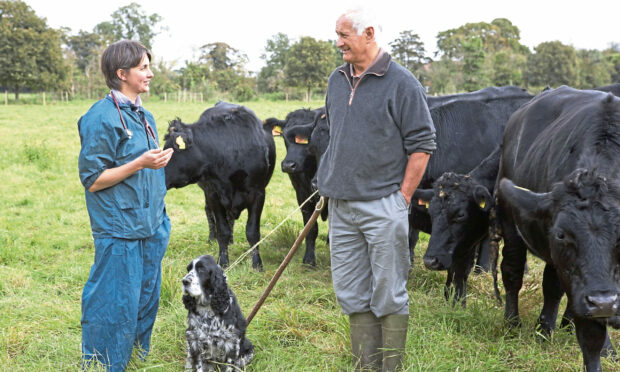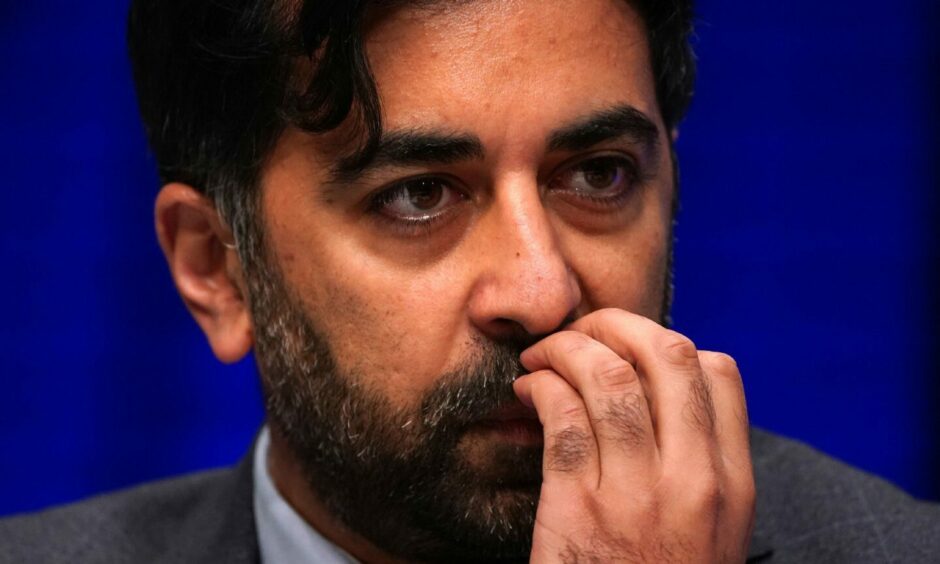Sir, – As a graduate of the Royal (Dick) School of Veterinary Studies University of Edinburgh in 1969, who worked subsequently in farming practice in Caithness and Stirlingshire for four years before settling in Cumbria, I have followed with interest your paper’s account of the intention of the Scottish Agricultural Colleges (SAC) to create a new veterinary school in Aberdeen.
Furthermore, I taught Professor Caroline Argo – the prospective dean of this new veterinary school – when she was a student at the University of Liverpool’s School of Veterinary Studies.
The need for a new veterinary school in Scotland must be put in context of current trends within the veterinary profession – a 24% reduction in the number of veterinary graduates admitted annually to the Royal College of Veterinary Surgeons (RCVS), and 77% of all UK new graduates being women.
In the RCVS Workforce Summit preliminary report of May 2022, 50% of practicing veterinary surgeons were dissatisfied with their chosen career – poor salary, little professional support from their employer, lack of further professional educational opportunities to study for higher qualifications, and the need of women to take career breaks for family reasons.
The RCVS admit that Brexit has been a significant factor in the present declining number of practicing veterinary surgeons, together with a large increase in pet ownership associated with the Covid pandemic that has increased owners’ requirements for small animal veterinary care.
Given these facts, I fail to understand why the dean of a new veterinary school in Aberdeen should be seeking to recruit a new type of undergraduate from Scottish rural communities when the veterinary profession itself cannot offer new graduates a satisfying career in general practice.
Way back in the 1970s, a time when the veterinary practicing arm of the profession was held in the highest esteem by farmers, pet owners, animal charities, local authorities, central government, and in the local communities where they lived, the SAC and Edinburgh-Glasgow veterinary schools offered good support for all veterinary practitioners working in Scotland and these organisations often co-operated with each other.
For veterinary clinicians, to problem-solve new emerging diseases in livestock was a pleasure because the profession supported itself, with any associated scientific advances in farm animal, equine, small animal health being attributed to both the clinician who had first encountered the case and the diagnostic team who had investigated it.
If the primary objective of the Aberdeen school is “to get veterinary students into practice earlier so they can experience life as a working vet earlier in their studies” then I suspect that their eventual disillusionment as practitioners may be expressed earlier in their unfulfilled careers.
In 2021, the SAC stated “our consultants in 25 offices across Scotland have served farmers and crofters, multinationals and governments… as the demands and expectations of agribusiness has evolved”.
Your readers will note that the rural veterinary practitioner has little role to play in this chain of communication between SAC and farmers, a concept outlined a couple of years ago at the annual conference of the Association of Veterinary Teachers and Research Workers, when the importance of veterinary research scientists was stressed but that of practicing clinicians ignored.
Perhaps a more sustainable Scottish livestock industry can be created, not by changing veterinary educational standards and lowering university entrance requirements but improving the career aspirations of veterinary graduates with excellent practical clinical and problem-solving skills.
Where veterinary practitioners live and have a fulfilling work-life balance is not the issue – it is about their value being recognised within society and the support that the veterinary profession generally can give them.
Richard Murray. MRCVS (retired).
Heads in the sand over independence
Sir, – You kindly published a letter of mine in which I set out the economic impossibility of running a viable Scottish economy and currency after independence.
Interestingly, reactions to my letter from your regular nationalist stalwarts wilfully ignored every point made – I wonder why?
Their principal counter argument, and demand to break up the UK, was derived from an OBR forecast that Brexit may cause a 4% fall in output.
Compare that with our small tax base paying for the combined effects of Scotland’s share of the UK national debt, the enormous deficit of tax income over government expenditure, the loss of the Barnett Formula, the doubling of the public sector costs, the cost of new armed forces, and much, much more. Add to that the flight south of capital and high technology companies if the threat of secession becomes real.
Furthermore, a new report commissioned by ScottishBusinessUK predicts 250,000 job losses in Scotland after independence.
As we have nowhere near the tax income needed to service the debts and pay for the enlarged public sector, not to mention pensions, no bank or monetary fund would lend to Scotland and without borrowing no economy can function.
The idea of rejoining the EU with our current deficit already well over three times their permitted maximum, and growing, is risible.
Ignore these points if you wish but if you think a 4% economic shrinkage is catastrophic just try independence, you will not know what has hit you.
Richard Marsh. Strathdon.
Defence of Scotland is a serious matter
Sir, – With a new first minister now in the driving seat of Scotland and his view that the country will still want independence from the UK, I feel he needs to have a wee think as there are many matters that need to be addressed.
The defence of Scotland going alone is a serious matter that will need to be set up and fixed very soon.
The UK at present is able to secure all of its residents with the Army, Royal Navy and Royal Air Force.
If Scotland does get independence then a defence force of its own would be required.
A very large ocean-going Russian tug (Nikolay Chiker) going slowly from east to west of the Shetlands does not make me feel safe. No one knows what the tug is doing but I would bet that it is spying on Scotland.
Yes, we need security in Scotland but it will come at a price that even the SNP does not have the funds to set up.
Gavin Elder. Peterhead.
Don’t shut down legitimate debate
Sir, – It is interesting to observe that I (along with other unionists) have clearly ruffled a few nationalist feathers (Hugh Morris, GR Weir, letters) by spelling out some home truths about the appalling track record of the SNP at Holyrood and the fact they cannot give basic answers about currency, pensions, trade, dealing with our twin deficits, and so on in an independent Scotland – notwithstanding the unaccounted for membership funds.
Look no further than the recent acrimonious leadership debate when Kate Forbes “trashed” the SNP’s record (her thoughts, not mine) and Fergus Ewing has now accused the “green tail of wagging the yellow dog”.
Anyone confident in their arguments would counter our assertions robustly with different figures quoting their sources by recognised and credited organisations.
But no, the likes of Messrs Morrice and Weir have resorted to straw man arguments and ad hominem attacks in a pathetic attempt to deflect the lack of any substance to their own independence dreams.
Methinks they need to take a long, hard look in the mirror before indulging in such unwarranted and anti-democratic behaviour in their attempt to shut down any legitimate debate.
Needless to say, they will not succeed.
Ian Lakin. Aberdeen.
Time to rethink transport plan
Sir, – We have been writing to Transport Strategy at Aberdeen City Council (ACC) for some time now with very few real answers coming back.
It’s worth noting that Manchester city has “paused” its scheme following concerns from the public over uncertain data and economic disadvantages to citizens.
These plans were formed long before the economic damage of Covid and more recent cost-of-living, energy and war in Ukraine crises we are all facing.
Our concerns are for working people and traders who need to access vital areas for business, e.g. Miller Street trading estate, Regent Quay, Church Street.
It’s also a real concern for access to domestic properties on Rosemount and the city centre.
It should be understood that not everyone can avoid these areas and stay in business.
There is little financial help available for small businesses and the impact on citizens’ access to the beach leisure areas is also under threat.
We are seeing citizens’ access to leisure being restricted across the city – its time for a wake-up call.
Transport Strategy ACC have shown little real attempts to offer solutions such as commercial business being given a pass for five years which would give time to re-vehicle.
How much damage would that cause?
There is no confirmation from them that Aberdeen Harbour will ban diesel engines and generators running the port which sits exactly in the proposed zone Market Street and Regent Quay. etc.
We support cleaner air but cutting off business life-blood should not be the cost. Given the pressures we all are experiencing its well worth a rethink as Manchester’s mayor has done.
Aberdeen can little afford the additional damage that will be caused let alone the costs being incurred, or is it all about generating revenue via fines for non-compliance?
Yes, it’s a stay of execution till 2024 for us lowly non-complaint vehicle drivers, but that’s not very far away.
There is sufficient time, however, to pause and take stock.
T. Morgan, director, SME.





Conversation